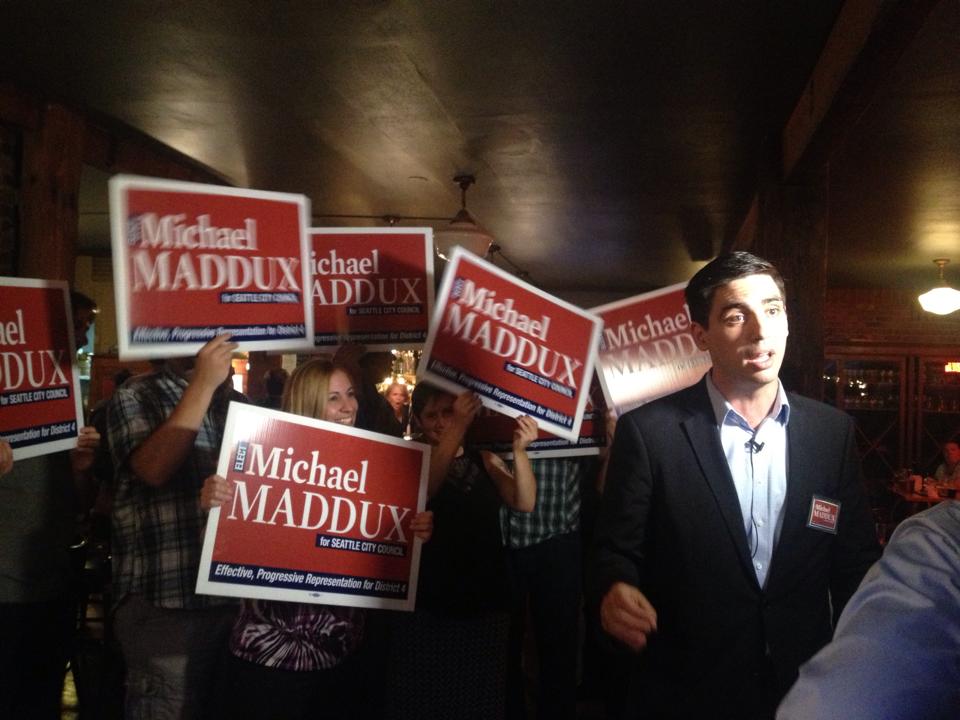The initial primary results are in, and we can safely assume who will be moving on to the November general election for Seattle City Council.
District By District
District 1: Shannon Braddock and Lisa Herbold will be facing off. Braddock is considered the “establishment” candidate, representing the legacy of West Seattle with endorsements from current Seattle City Councilmember Tom Rasmussen, King County Councilmember Joe McDermott (for whom she works as Chief of Staff), and King County Executive Dow Constantine. Herbold has been billed as the lefty of the two, coming from 17 years as Nick Licata’s legislative aide. She also worked for the Tenant’s Union and ACORN. Left behind were Brianna Thomas (our endorsed candidate), the former campaign manager of SeaTac’s $15 minimum wage campaign who ran to the left of Herbold; and Phillip Tavel, a former judicial candidate who surprised everyone with his Seattle Times endorsement.
District 2: Current councilmember Bruce Harrell has a strong lead over newcomer and food advocate Tammy Morales (our endorsed candidate). She is hoping to ride a wave of discontent over Harrell’s alleged lack of leadership. Socialist Alternative candidate Occupy and housing activist Josh Farris came in third with a meager 13%, signaling that this district is skeptical of the far-left wave that boosted Sawant and Grant. Morales faces a tough road through the general, needing to win all of Farris’s votes and knocking Harrell down an additional 12%.
District 3: The favorite of rowdy crowds everywhere, capital “S” Socialist Kshama Sawant (our endorsed candidate) came in at 50%–not a strong showing for an incumbent with her level of name recognition. Her anti-developer pro-density populism has some urbanist voters skeptical. She’ll face off against Pamela Banks, President of the Urban League, who will likely be buoyed by corporate dollars eager to see Sawant kicked out of office. Watch for this becoming the most expensive race in the City. Rod Hearne, one of just two openly gay candidates, brought in 10% of the vote–lower margins than expected for a district that is home to Capitol Hill, the largest gayborhood in the Pacific Northwest.
District 4: The two strongest urbanist candidates–Democratic activist Michael Maddux (our endorsed candidate) and Transportation Choices Coalition Rob Johnson–both beat out incumbent Jean Godden and neighborhood activist Tony “Bulldozer” Provine. Many were disappointed with Godden’s lackluster performance while she skipped endorsement interviews and leaned too heavily on name recognition. Johnson, who was endorsed by the Seattle Times, will likely be portrayed as the inside candidate, perhaps scoring the endorsement of Mayor Murray. “Outsider” Michael Maddux, who brings a witty edge that won him the endorsement of The Stranger, has ground to gain but the grit to do it. This district is a huge win for urbanists.
District 5: In perhaps the biggest upset of the night, former judge and Blackfeet Nation member Debora Juarez shocked everyone with a commanding 2-to-1 lead in District 5 over crowd favorite Sandy Brown (a leader in the marriage equality, homelessness, and gun responsibility movements). Planned Parenthood organizer Halei Watkins (our endorsed candidate) came in third, but well ahead of the rest of the competition. With five candidates knocked out, it’s hard to call where the votes will redistribute.
District 6: Incumbent Mike O’Brien (our endorsed candidate) came out ahead with 58%, leading over neighborhood activist Catherine Weatbrook. His margins were middle of the pack for incumbents—higher than Godden, Sawant, and Burgess but lower than Bagshaw and Harrell. Weatbrook performed strongest among all neighborhood activists with 22% of the vote, beating out Bill Bradburd (15%) and Tony Provine (14%).
District 7: Sally Bagshaw (our endorsed candidate) was the strongest incumbent with 76% of the vote against two weak challengers. Most surprising was the almost unknown Deborah Zech-Artis beating out techie Gus Hartmann, who received a stinging rebuke from writers at The Stranger for his passive aggressive flower delivery in response to their not-so-passive rebuke of his fashion choices.
City-Wide Position 8: In the race with three Jo(h)ns, City Council President Tim Burgess (our endorsed candidate) stuck out with 47% of the vote—the weakest showing of any incumbent. Burgess has tried to shake a reputation of being the most “conservative” member of Council—a relative title in the liberal paradise that is Seattle. Former Tenant’s Union Executive Director Jon Grant, who allied himself with Sawant, beat out his fellow challengers, including musician John Roderick and longshoreman John Persak. Burgess has a wide lead on Grant, but will have a race on his hands going into the general.
City-Wide Position 9: Lawyer Lorena Gonzalez (our endorsed candidate) beat out neighborhood activist Bill Bradburd by a margin of more than 4-to-1. Trailing in third is urban planner Alon Bassok who released a series of plans on transportation and affordable housing that didn’t capture the attention of voters. Local gadfly (the nicest name I could think of) Alex Tsimerman somehow picked up over 1000 votes, leaving us hoping that voters didn’t read the pamphlet and instead just liked his name.
General Overview
The primary was a big win for urbanists in need of a pick-me-up after HALA drama. Seven of our nine endorsed candidates are moving on to the general, with five leading their respective races. Neighborhood activists suffered resounding defeats, squelching the myth that the loudest anti-growth voices in the room represent the broader will of the city. Instead, even the conservative-tilted demographics of a primary election went for progressive candidates that articulated a vision for a sustainable, equitable, and affordable city that welcomes growth and density.
It was a bad night for young candidates, with Brianna Thomas in the 1st, Abel Pacheco in the 4th, and Halei Watkins and Mercedes Elizalde in the 5th all ending their bids—though Michael Maddux will continue on.
District elections proved a boon for candidates from marginalized communities. It was a great night for women, who represent ten of the top eighteen candidates. Indeed, three races (the 1st, 3rd, and 7th districts) are between two women. People of color also came out ahead, representing seven of the top eighteen candidates. Three race (the 2nd, 3rd, and 5th) will be exclusively between people of color. LGBT folks, who had just two candidates across the nine positions (Rod Hearne in the 3rd and Michael Maddux in the 4th), will see one candidate move on to the general, posing a risk of the the first time since 2003 that the Council will not have an LGBT member.
The Seattle Times endorsement also seemed to boost the performance of several candidates. Phillip Tavel in the 1st leapt to third place with 19% of the vote. Rob Johnson in the 4th was a head above his closest two opponents, including incumbent and former Times columnist Jean Godden. Debora Juarez also outperformed expectations with an 18% lead over Sandy Brown. The Stranger also faired well, likely boosting Maddux in the 4th, Juarez in the 5th, and Grant in 8th (citywide).
The races to watch in the general will be District 1 (Braddock vs Herbold), District 3 (Sawant vs Banks), District 4 (Johnson vs Maddux), District 5 (Juarez vs Brown), and Position 8 (Burgess vs Grant). The rest appear largely settled.
Incumbents generally fared well in the election, with only Godden losing her bid after sleepwalking through the campaign. There seemed to be an inverse relationship between the recent attention an incumbent received and their margins. Sawant, Burgess, and O’Brien were all subject to recent news coverage for various reasons (e.g., rent control debate, being Council President, and the #ShellNo protest) and had the lowest showings. Whereas relatively quiet councilmembers Harrell and Bagshaw both saw support of more than 60%. Also of note: ideology didn’t seem to be at play. Sawant and Burgess represent opposite sides of the political spectrum on Council and both had low margins hovering around 50%. In this regard, there was no clear mandate from voters for a fresh Council as many expected.
Editor’s Note: This article has been updated as of 9:10am, August 6, 2015.

Ben Crowther
Ben is a Seattle area native, living with his husband downtown since 2013. He started in queer grassroots organizing in 2009 and quickly developed a love for all things political and wonky. When he’s not reading news articles, he can be found excitedly pointing out new buses or prime plots for redevelopment to his uninterested friends who really just want to get to dinner. Ben served as The Urbanist's Policy and Legislative Affairs Director from 2015 to 2018 and primarily writes about political issues.


